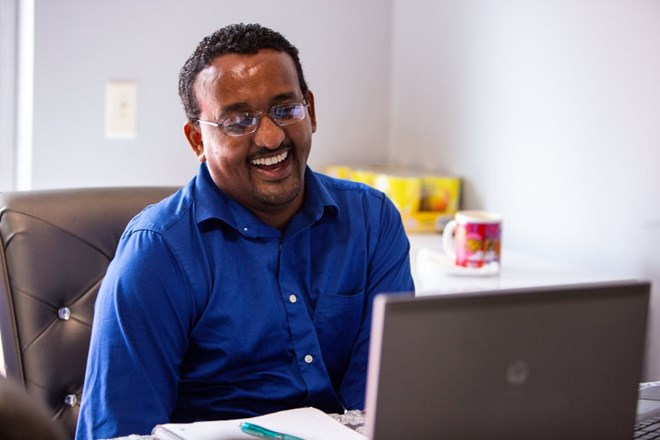
By Faiza Mahamud and Mary Lynn Smith
Tuesday August 11, 2020
Letter to health officials says racial inequities led to mistreatment of Somali patients.

Hassanen Mohamed hosted a meeting of the support group Somali COVID-19 Families from his home in Brooklyn Center on July 18. NICOLE NERI – SPECIAL TO THE STAR TRIBUNE
Hassanen Mohamed has watched as the COVID-19 pandemic has quietly claimed the lives of elderly Somali Americans and upended life in his vibrant, close-knit Minneapolis community.
After a recent surge in deaths, hospitalizations and community reports of inadequate treatment by health care providers, Mohamed and eight others banded together in June to advocate for immediate changes in a health care system they say is "mistreating and misrepresenting" Somali COVID-19 patients and their families.
"Some of us work in these hospitals. We know what is going on and we see the trends," said Mohamed, a businessman and activist who previously worked in the health care industry. "We want to make sure we advocate for best care and best practices for Somali patients."
They ask that patients have access to interpreters and chaplains and that families be treated with respect and be allowed to participate in the care of loved ones.
"Every day, we have been documenting various incidents of mistreatment affecting the care of our loved ones disproportionately because of bias, racism and unprofessional conduct of healthcare workers in these hospitals," the letter stated.
Imams on care team
The group already has seen some change, such as the recent addition of two imams to Abbott Northwestern Hospital's spiritual care team. Fred Bw'Ombongi, vice president of Access Management for Allina Health, said his organization is exploring offering similar services at its other hospitals.
In the long term, the advocacy group is pushing hospitals and health care facilities to increase staff diversity to better reflect the communities they serve. It also has asked for data to determine whether there are different outcomes for people of color.
National studies and MDH data show that COVID-19, the respiratory disease caused by the novel coronavirus, has disproportionately affected Blacks and other racial groups.
But state officials don't have enough reliable data to determine how the virus is affecting the Somali community, because patients don't always self-identify as Somali, according to MDH officials.
Minneapolis' Cedar-Riverside neighborhood, which is home to many East African immigrants, is one of more than a dozen neighborhoods reporting more than 150 cases of COVID-19 — the highest level seen across more than 80 neighborhoods in the city.
Many of the Somali community's elderly live in the area's high-rises, where social distancing is more difficult, especially for residents who must ride elevators.
"It's a hot spot," Mohamed said.
As the virus has spread, the advisory group has stepped in to fill information gaps and provide resources to those grappling with COVID-19. Amid social distancing rules, organizers have mobilized from their homes, using social media and mobile phones to set up a hotline to field calls from concerned families and patients.
In some cases, they explain medical terminology and provide information about medications and treatments. Other times, they simply listen as callers air concerns. Recently, the group helped a patient transfer to a different hospital to get better care, Mohamed said.
Ahmed Bokore turned to the group after his wife died of COVID-19 in early June. Bokore said his wife was transferred from one hospital to another without his consent. When he asked why, he said he was told it was to free up hospital beds for more seriously ill patients. Days later his wife died.
His experience highlights the challenges many Somali elders — who often speak little to no English — face when dealing with the health care system. Some have avoided going to the hospital, fearing they won't receive quality care or the support they need. Some have died at home.
"It is a daily occurrence," said DFL Rep. Mohamud Noor, who represents the Cedar-Riverside neighborhood, referring to the high mortality rate among elderly Somalis. "The whole system isn't working the way it should."
Speaking out
The advisory group expects to meet soon with representatives from the Minnesota Hospital Association and the MDH to discuss ways to better serve the Somali community.
"We know that structural racism is a root cause of health inequities," said Sara Chute, who helps oversee the MDH's Center for Health Equity.
Policies and practices need to be evaluated to ensure there's no bias, she said. It's not just about translating information into another language, but making sure it's done in a way that community members trust while feeling respected and valued. It's also about having staff that is representative of the community it serves, she said.
In two virtual meetings organized by the advisory group last month, families shared their experiences with lawmakers, hospital officials and MDH representatives.
"I was deeply sorry to hear these experiences that these families were sharing," said Dr. Rahul Koranne, president and chief executive of the Minnesota Hospital Association, who participated in one of the meetings.
Efforts to curb the spread of the highly contagious and deadly virus have created unusual circumstances, such as keeping families from visiting their hospitalized loved ones, he said. In addition, much is still unknown about the virus and how to treat it, complicating patient care.
"We don't know the standard of care for COVID yet," Koranne said. "Maybe we will in three to five years. … Right now we're still learning."
Family and health care providers may have different perspectives in some situations, Koranne said. But he also knows that there are inequalities in the health care system that need to be addressed.
"These conversations have helped spark a deep introspection," he said. "It's the beginning of a journey to deeply listen and come up with solutions."